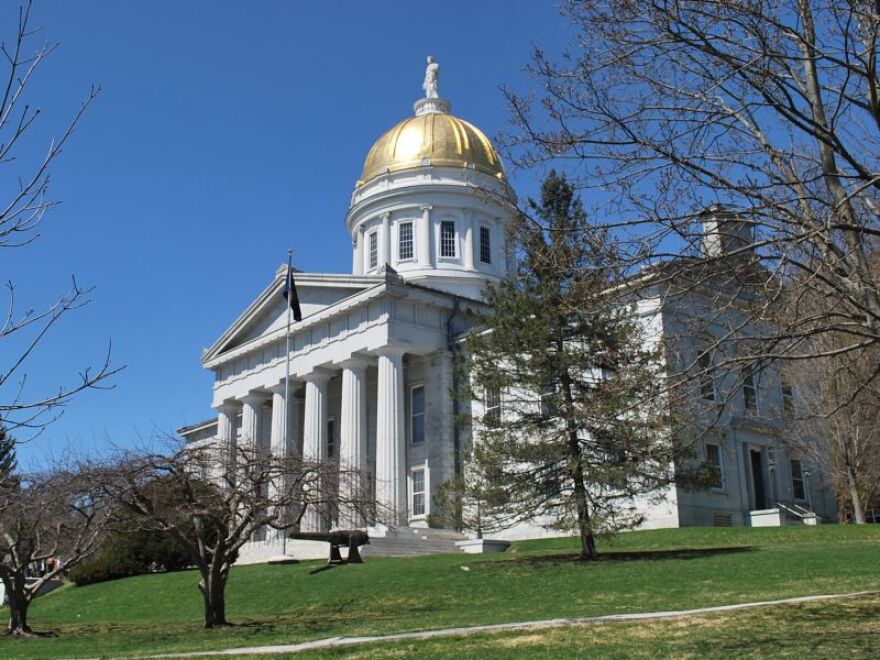A political confrontation over the issue of teacher health benefits has become the signature issue of the 2017 legislative session, but it’s being resolved almost entirely outside of the formal legislative process. The closed-door negotiations between a handful of Democratic lawmakers and the administration of Republican Gov. Phil Scott have shrouded the policy making process from public view.
On the evening of May 12, Senate President Pro Tem Tim Ashe rose from his seat on the Senate floor to deliver one of the last addresses of the 2017 legislative session.
Ashe argued that lawmakers cannot in good faith go along with Gov. Phil Scott’s plan to reduce teacher health care costs by $26 million. One of the main reasons, he said, is that the plan hasn’t been vetted by legislative committees of jurisdiction.
“What happened to the Legislature? The legislative process which makes sure that proposals get the full vetting that they deserve, that all the affected parties can come in and weigh in, poke and prod and say they either like it or don’t like it suggest changes?” Ashe said. “If that means nothing, we have to deeply think about the role of the Legislature in the future.”
It was an impassioned speech. But as lawmakers work behind closed doors this week to solve this ongoing policy dilemma, it begs the very question Ashe asked back in May: What happened to the Legislature?
“I do not disagree at all that this is not the ideal way to do business,” Ashe said in his pro tem’s office late Thursday evening, immediately after one of those closed door negotiating sessions with members of the Scott administration. “It should not be the way we do business. And in the future, I hope we don’t have to do it this way again.”
On June 6, Scott vetoed the state budget over failure to reach consensus with lawmakers on the teacher health benefits issue. The ensuing quest for a deal has included zero committee hearings, and no open meetings to discuss various policy alternatives.

Ashe concedes that this unconventional policy making process, conducted almost wholly outside the formal legislative process, lends itself to unintended consequences from whatever resolution those negotiations yield.
House Speaker Mitzi Johnson says she agrees.
“I can’t tell you how much it would be my preference to have had something like this on the table in January,” Johnson says.
Both Ashe and Johnson say the less-than-ideal circumstances under which negotiations have occurred are a product of the lateness of Scott’s proposal. Had the governor issued his proposal at the outset of the session, they say, the lawmakers would have been able to scrutinize the proposal more transparently.
They say they’ve tried to mitigate the potential damage by bringing in key committee chairs that have deep knowledge of the policy themes guiding the conversation.
Those assurances aren’t terribly comforting to people like Darren Allen, the communications director for the Vermont-NEA.
“Committees exist for a reason,” Allen says.
The Vermont-NEA represents the unionized educators whose health plans are the subject of the budget talks. Allen places blame for the situation squarely on Scott for pushing the plan in the first place. But he says the legislative process being used to resolve the dispute, or lack thereof, isn’t helping matters.
“It is very frustrating that the people who stand to be most affected in their day to day lives are conspicuously absent from the discussion,” Allen says.
Washington County Sen. Anthony Pollina, the interim chairman of the Vermont Progressive Party, says the process is a decidedly undemocratic way to go about making public policy.
"There's no public testimony, no committee hearings, no witnesses being called, no serious public discussion of the pros and cons so that Vermonters can actually make a decision as to what they feel about this issue." — Sen. Anthony Pollina
“One of the things that’s bothering me is the fact that right now… the options and the proposal are being discussed behind closed doors, essentially in secret,” Pollina said on Vermont Edition Friday. “There’s no public testimony, no committee hearings, no witnesses being called, no serious public discussion of the pros and cons so that Vermonters can actually make a decision as to what they feel about this issue.”
Arlington Rep. Cynthia Browning says this episode over teacher health plans reminds her of a similar debate back in 2007.
“And people wanted to do an education bill because they wanted to look like they were doing something about property taxes - does that sound familiar?” Browning says.
A late-session standoff between a Republican governor (Jim Douglas) and a Democratically controlled Legislature back then yielded a novel, 11th-hour compromise, known as the two-vote mandate. It basically required schools to have a second budget vote for spending increases above a certain threshold.
“We voted it into law even though many people in leadership and in the group either didn’t understand it or didn’t think it was a good idea,” Browning says.
Less than year later, after lawmakers had time to familiarize themselves with the true impact of their vote, they repealed the legislation.
Browning calls it cautionary tale in the dangers of passing poorly vetted proposals that touch on massive policy arenas, like education and health care. And she says she fears the deliberative process being used now might yield the same result.
“Well I think that if I were a betting woman, I would put my money on something awkward that would have unintended consequences,” Browning says.
Browning says there are some reasons she’s hopeful that won’t be the case, namely Ashe and Johnson, both of whom she says have extensive experience in the budget and tax arenas.
“I know those people know the economic and financial realities, not just the political realities,” Browning says.
Lawmakers will return to the Statehouse for the veto session on Wednesday, June 21. Ashe, Johnson and Scott all say they hope to have a compromise plan ready for their review before then.





